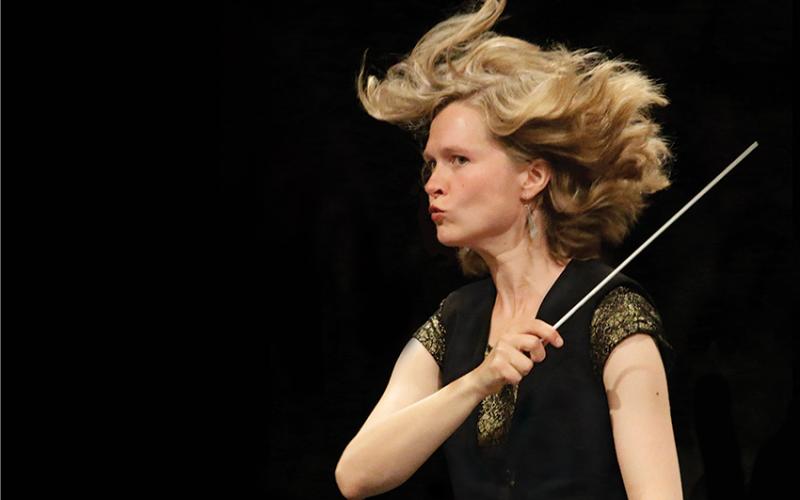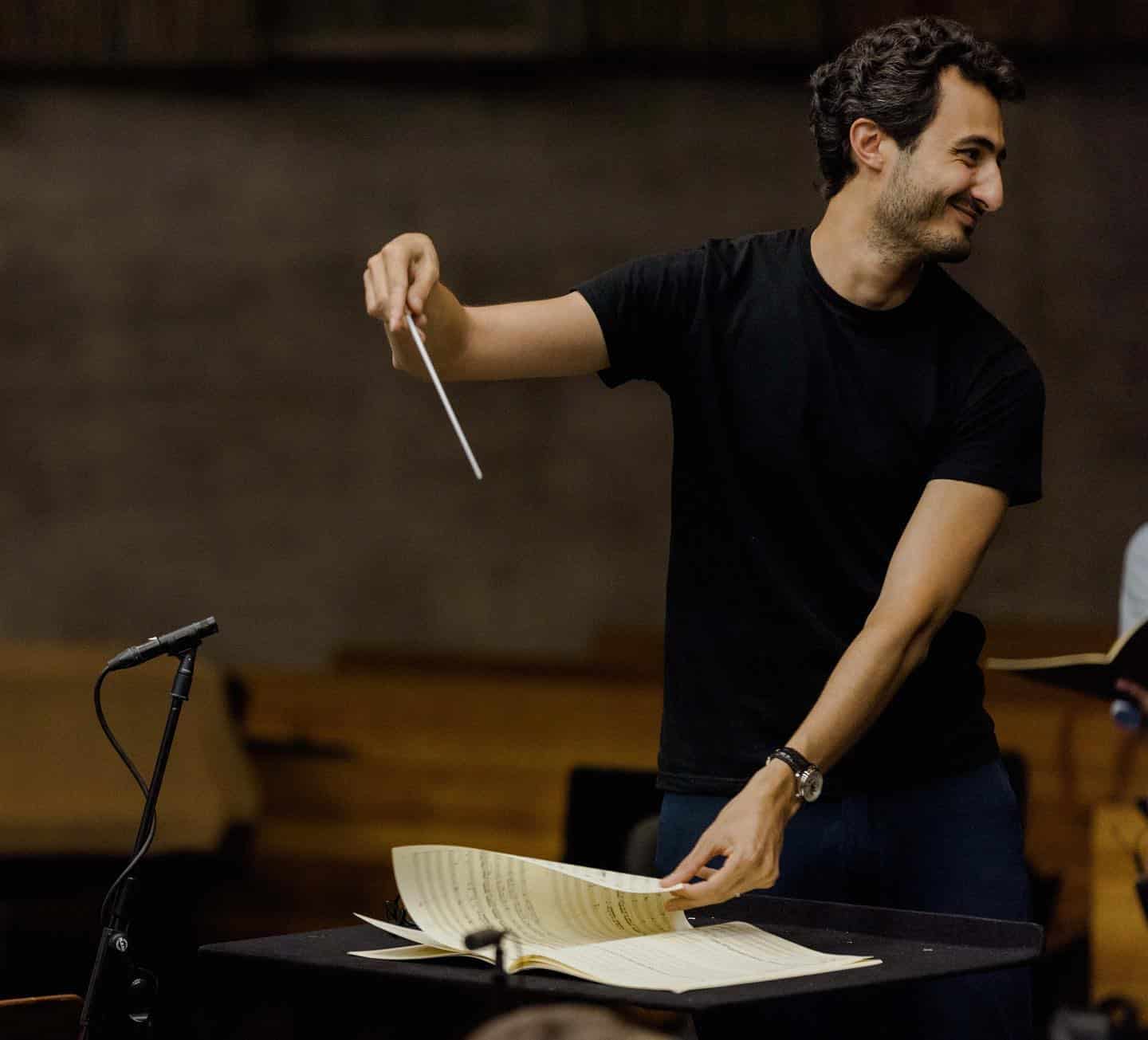Music critic: Mirga ‘needs to find her inner man’
mainIn the first part of a fine BBC Radio 4 documentary series on Mirga Gražinytė-Tyla’s opening year as music director in Birmingham, the Telegraph critic Ivan Hewett is asked to reflect on her strengths and weaknesses. He proceeds to get his metaphors somewhat in a twist:
There are areas of the repertoire where she’s trying things out. Perhaps that symphony (Mahler 1) and others like it might have a certain maleness built in to them, actually…. It’s the sheer size of those musical statements that requires perhaps a more directing personality… Maybe she’s going to have to find her inner man, as it were, just to pull off those really big, rather showy extravagantly subjective pieces… I am sure she’ll crack it. She’ll master anything she turns her hand to.
Listen here.![]()

![]()
UPDATE: He apologises.





Hewitt’s criticism is often very readable, reasonable and informative, but something went wrong this time. Mirga finding her “inner man”? Why? I would rather want to listen to her “female” Beethoven 8 (the purest symphonic maleness).
He was trying to suggest that there was something about the ‘big’ symphonies of Mahler and Bruckner that originally brought forth the need for the maestro, with all that became associated with the term (male, dominant, physically imposing in many cases), who would impose a degree of control and single-minded interpretation that he thought lacking in Mirga to date (evidencing her handling of Mahler 1).
He chose to define this as being a male quality – chiefly the impulse and/or ability to impose yourself on a group when needed, in the cause of giving a satisfying ‘take’ and the appropriate unity in performance.
It is worth pointing out that Hewett was clearly a fan of hers, though some will doubtless find his view patronising and/or incorrect.
Yes – I agree with your comment. He wasn’t wrong about the type of quality those works have, but he was wrong to define it as male.
He clearly is a fan of hers and I bet he’s really embarrassed.
No one has mentioned the long long years of diluted music making and ensuing agony from “effeminized” male conductors infected by HIP.
Disagree entirely.
+1
PLease put your money where your mouth is and NAME SOME!
The opinions of trolls do not come from their mouths.
We could prevent Mr B from commenting on this one.
Sally
Defining conducting style or technique using gender-specific language is confusing and non-specific at best, damaging at worst.
Surely we can do better in the field of music criticism.
Using ‘male’ and ‘female’ is very helpful in describing music actually in some cases. Or it used to be. When men were not ashamed to be men and women not ashamed to be women.
Humans have mixed gender qualities in their psyche / character, and in musicians the ‘opposite’ gender is often stronger represented than in people suffering from the absence of musical talents. In the music itself this can lead to unusual combinations: a ‘feminine’ Chopin hooking-up with a matrone, Wagner’s ‘masculine’ pomposity while cultivating cross-dressing at home, Strauss celebrating blatant heroism in his music while bowing under his wife’s regime, ‘feminine’ Debussy chasing beautiful women, ‘masculine’ Ravel without any love life whatsoever, etc. etc.
Bravo
Johnny Bortslap us absolutely right. A.
I suspect he is saying that, in his opinion, for some works you need more tension or impact and that Mirga still needs to develop those aspects in her method of conducting, in some instances.
I don’t think the ‘inner man’ reference is helpful and I agree with Sharon that it is confusing as we end up trying to guess what he really meant.
I would add that this topic is only a small part of the full broadcast and that the rest of it tells something of Mirga’s story with the CBSO to date, is interesting and worth a listen.
Kein problem. It’s a way of saying, and we all know what he meant. No “sexism” involved, unless you really want it
Above all,she should learn to conduct the orchestra,not with the orchestra…
I’m about ready for a gender- and race-free world so we can quit microagressing over every perceived slight.
Feminine and masculine traits are real, though I fail to see how they would affect an interpretation of a piece. I’ve told groups to play more aggressive or more delicately, but never more masculine or feminine.
Let’s say it simply: just idiotic
I’m 100% sure Mirga will be one of the most successful (male and female) conductors in the coming years or even decades. Coz no matter what she does or doesn’t do, people will just keep talking about her. She and her team can only win.
Mirga, keep going! You are the best~
No she’s not the best, she beats time to the music, to what her superb orchestra is doing. She needs to find a way of indicating her wishes a few micro-seconds earlier in ‘real time’ IMHO.
Maybe her wishes are shallow.
Codswallop. Try talking to some of the actual musicians.
Norman, Thank you for providing the link for the BBC Radio 4 program on Mirga. I am looking forward to listening to her conducting at the Proms this year!
Let’s she if she will find her “inner man” for Beethoven’s 5th!
It was interesting to hear her comment about the school concerts in Birmingham (at 38’02) where she says about the audience: “Wow! It could in Cairo! Such a multicultural city”.
Could Birminham’s demographic evolution have anything to do with cutting funding for a “Western Classical orchestra”?
Correction!
Let’s see, not Let’s she.
It could be in Cairo, not It could in Cairo.
Take it easy. We already auto-corrected all these typos at reading:)
Indeed, English has a relatively primitive coding scheme, which only exploits the one-dimensionality of the alphabet system. But it still has an inherent coding redundancy that is pretty against noise and local disturbances.
Aoccdrnig to a rscheearch at Cmabrigde Uinervtisy, it deosn’t mttaer in waht oredr the ltteers in a wrod are, the olny iprmoetnt tihng is taht the frist and lsat ltteer be at the rghit pclae.
https://goo.gl/Do6Axg
“pretty against noise”?
“pretty robust” 😀
Last season I heard Mahler 1 twice — Alan Gilbert with the NY Phil and Anu Tali with the Sarasota Orchestra. Just my opinion, of course, but I preferred the latter.
There circulates a theory among Mahler scholars which suggests that Mahler symphonies are much better suited to female conductors because of the incoherence, hysteria, sentimentality, structural deficiencies and preference for occasional but entirely unmotivated fortissimo tuttis, and that this could play an emancipatory role in the further development of feminism, leading to a better understanding of the female psyche and thus, to an enhancement of respect and appreciation concerning the female sex and a deconstruction of male prejudice.
“incoherence, hysteria, sentimentality, structural deficiencies and preference for occasional but entirely unmotivated fortissimo tuttis…”
Had to laugh out loud as this pretty much encapsulates everything that irritates me about Mahler’s symphonies (well, almost everything — no mention of the blathering on & on & on). However, these always struck me as characteristics typical of a self-involved male 🙂
Have to agree with both yourself and John regarding these comments. At last; somebody on the same page!!!
Funny guy! Don’t tell Sally you have been reading such subversive materials…
We will try to keep an eye on that in the future.
Sally
sounds like typical case of the reviewer who is very much in touch with his “outer” man
As others have said, it seems like the writer is a fan, and his “if you will” shows that he doesn’t automatically buy into the male/female personality paradigm. However, his attempt to talk about things in those terms really doesn’t work,— the same way it doesn’t work when actual sexists try to do so. He probably would have preferred to talk about her conducting in terms of needing to develop a grander overall vision, and more force of personality so that she is able (and willing) to impose that vision onto the music and onto the musicians. Strength of character, ambition, willingness to take charge, overarching artistic vision, etc. are not “male” personality traits any more than tact, sensitivity, and willingness to work with others instead of just bossing them around are “female” ones.
It’s a good lesson in the fact that it’s never a good idea to adopt (or pretend to adopt) a set of principles you don’t agree with, just for the sake of discussion. Or if you do, make it very very clear what you’re doing: “This whole ‘male’ vs ‘female’ personality thing is ridiculous, but if one were to think that way, one might say she needs to find her ‘inner man’.” (Of course, that still wouldn’t necessarily stop NL from quoting you out of context, but it might make it clearer to readers.)
Say, has anyone else noticed that that photo of Mirga makes her look like she has Trump hair?
Alondra de la Parra became an “maestro” at the age of 37. Critics should give MGT a break until she reaches the same age in 6 years.
Flouncy hair does not convey a seriousness about music, it is a major distraction. If a woman cannot convey sufficient inner strength to direct so many people, she will flop like her hair. Nor should a man have flouncy hair.
Kent Nagano is taking note:D
As is Leonidas Kavakos.
We have strayed a long way off piste but hair style has nothing to do with ability in music.
There are all kinds such as –
Stephane Deneve, Vladimir Jurowski, Rafael Payare, Gustavo Dudamel, Nicholas Collon, Simon Rattle, Barbara Hannigan etc. not to mention all the heavy metal and pop groups who made their names with long hair!
The very best conductors are bald (Erich Kleiber, Beecham, Boult, vZweden, Rozhdestvensky, Solti, Malko, Szell, Leinsdorff, Janowski). The problem is that hair absorbs energy which has then to be shaken-off in the allegros and tuttis. Especially female conductors suffer from this affliction.
Why can’t orchestral condcuting not be a typical man’s job like truck driving, chimney cleaning and jet fighting? There will be exceptions, and they should be respected, but why forcing gender equality where it does not seem to relate to reality? Is male conducting really only and exclusively a cultural construct? Just asking. A female bus driver will have steering assist system (PAS) so that she does not need the full physical force to get the thing around the corner, but the orchestra does not possess such device.